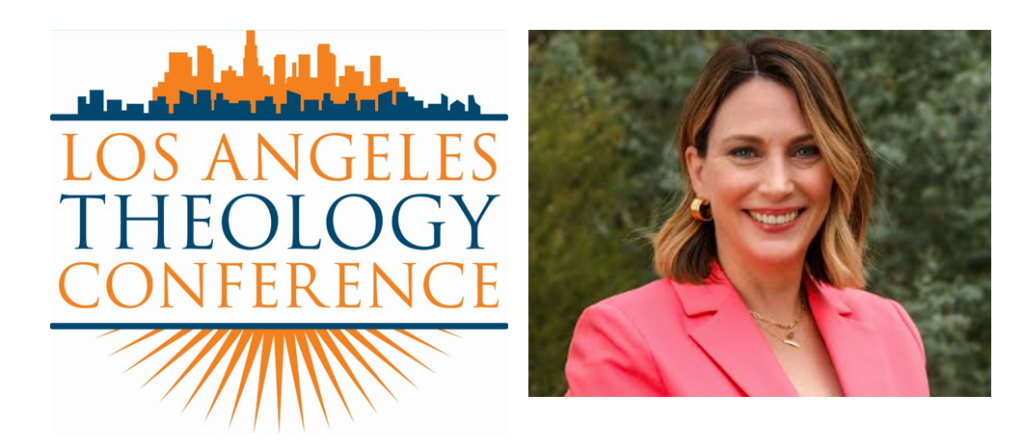A scene from The Canterbury Psalter (12th century)
Blog
“The Bringing of Things to Their Fullness of Life:” Jacqueline Service at LATC 2025

Jacqui Service’s LATC parallel paper is a perfect example of a conference paper in which a scholar extends and explains a recent book. Dr. Service’s summer 2024 book on the Trinity still seems brand new, and her proposal for how to talk about the God-world relation in redemption has not yet been adequately engaged by the scholarly community. Enter the conference paper! Without simply reporting on or rehashing her monograph, Dr. Service builds on that work and takes the next step, a step directly in line with the conference theme. Theology conferences are fit for many purposes, but one of my favorites is this intelligent use of a scholarly gathering to circulate large-scale theological projects in manageable small sizes. Conferences are also great for getting to hear the speaking voice of authors who you’ve only read. It’s always striking for the voice in your readerly head to be replaced by the actual tones and expressions of the speaking author.
Here’s a brief interview with Jacqueline Service sharing in her own words about the paper she’s presenting at LATC 2025, March 12-14:
Q: LATC 2025’s theme is Receiving Redemption, and it focuses on how salvation is received by human persons and communities. Why did this aspect of soteriology catch your attention and make you propose a paper on it?
This area of theology is particularly interesting because it confronts us with difficult questions that have agitated theologians for generations—how we comprehend the tensions between grace and works, Divine sovereignty and human will, moral freedom and limitation, determinism and libertarianism, universalism and exclusivism. The debates inherent in these topics immediately recall Augustine and Pelagius, Luther and Erasmus, Calvin and Arminius. If those themes weren’t enough to bend our brains, the question of receiving salvation raises even further complexities—whether a gift can truly be given, and whether there are theological and philosophical challenges tied to the very idea of ‘receiving’ the gift of salvation. On these issues, Kathryn Tanner and John Milbank’s work comes to mind. If these are the kinds of discussions being thrashed out by colleagues at LATC, then I think we’ll have some dynamic conversations!
While my paper ventures into these thought-provoking areas, one of my aims is to write a paper that connects the deep end of these theological concerns to the reality of our lives. Ultimately, I believe the best kind of theology, as Thomas Torrance puts it, must at some point translate the rationality and ‘inner logic’ of faith “back into ‘the flesh and blood’ of reality.” (Thomas. F. Torrance, Incarnation: The Person and Life of Christ, ed. Robert T. Walker (Downers Grove: IVP Academic, 2008), 233.
Q: The title of your paper is “Kenosis of the Spirit and the Dynamics of Salvation.” How will you be approaching the conference theme in this paper and how does this paper fit in with your previous theological work, or with your recent scholarship?
In my recent monograph Triune Well-Being: The Kenotic-Enrichment of the Eternal Trinity (Fortress Academic, 2024) I explore the concept of the all-blessed, well-being of God as the ontological source and context of created well-being. Part of that exploration revealed that at the centre of the triune relations is kenosis—not a kenosis truncated to a concept of diminishment, but what I call an ‘enriching-kenosis’—the self-giving movement towards ‘other’ that is, in fact, symbiotic with life, indeed with the very life and being of the Triune God. The paper I will deliver at LATC presses a little more into the articulating how the Holy Spirit, expressing the divine nature, initiates human receptivity to salvation by enabling a yielding and orientation toward the same kenotic movement inherent to divinity. If salvation is the restoration of creation through union with God—the bringing of things to their fullness of life—then it appears that there must be a correspondence between the way ‘life’ occurs in the Creator and the attainment of that life in the creature.
Q: What are you looking forward to at the conference? Are there any papers or theological issues that have especially caught your eye?
Gosh! I must admit, I am a bit of a fan of Kathryn Tanner, as I admire the creative stretch of her theology that simultaneously operates in consonance with the ‘guardrails’ of the Christian tradition. I appreciate how she engages with foundational Christian principles and yet is unafraid to innovate and explore the vast dimensions of truth. I’m looking forward to being both inspired and challenged by Prof. Tanner’s paper as I continue to shape my own theology —one that similarly strives to be faithful yet expansive, delving into the boundless depths of God. I’m sure we’re all in for an interesting paper from a scholar who has described the “theologian’s motto” as: “Dare to think differently where necessary.” (Tanner, 2022 “Costan Lectures, Experiments in Early Christian Theology” on YouTube )
About This Blog

Fred Sanders is a theologian who tried to specialize in the doctrine of the Trinity, but found that everything in Christian life and thought is connected to the triune God.


